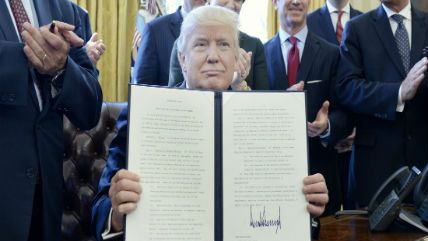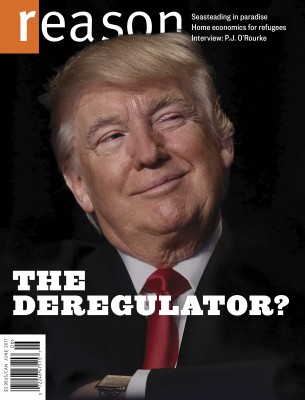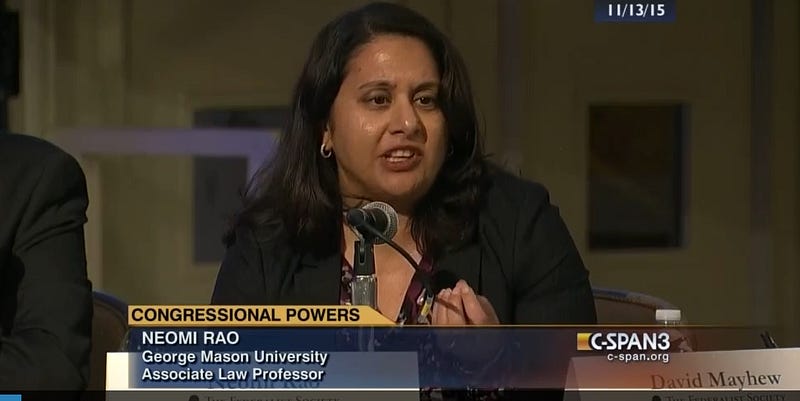Report: Regulation 'Has Essentially Ground to a Halt' Under Trump
The Obama administration submitted 118 new rules in the same time it has taken Trump to make just 39


Is Donald Trump really turning out to be a deregulatory president? And is his gimmicky kill-two-regs-for-each-new-one executive order (which, I've come to find out, is known as the "Stossel Rule") actually making a dent in the administrative? Yes to both, argues an article today in Bloomberg BNA. The evidentiary nut:
Since President Donald Trump was sworn into office Jan. 20, just 39 rules have been submitted for review to the Office of Information and Regulatory Affairs (OIRA), the agency that reviews all significant federal regulations. There are currently 16 pending agency actions.
By comparison, the administration of fomer President Barack Obama had submitted 118 rules by the same point in the president's first year, according to the RegInfo.gov database.
When I was interviewing libertarian regulation types for the June cover story, not a single one treated the two-for-one guidance as a serious deregulatory tool. "It is a fake solution to a very real problem," Ike Brannon, a Bush-era official at the Office of Information and Regulatory Affairs, told me. "It's so easy to conceive of how the EPA could game 'two rules out for one rule in': You pass a whole bunch of half-million-dollar rules, and those are the rules you take off." Even the anti-deregulation hysterics in the media weren't getting too worked up about that particular rule.
But that judgment may have been premature. According to the Bloomberg BNA piece, the requirement throws up a significant obstacle because it seeks not just a numerical swap but an offset on regulatory costs going forward. Since environmental regs in particular tend to front-load the compliance burden on companies, it'll be hard to find enough existing rules (whose main costs have already been swallowed) to zero out the front-end costs of whatever new regulation is being proposed.
"And that's why, in my view, the two-for-one executive order really is not meant as a two-for-one trade at all, but instead just as putting the brakes on new regulations," former Department of Interior deputy assistant secretary Amanda Leiter said at an American Bar Association administrative law roundtable last week.
More in that vein:
Andrew Grossman, partner at Baker & Hostetler LLP and adjunct scholar at the Cato Institute, agreed that the executive order raises an expressly deregulatory agenda and is a "stunningly blunt" tool.
"But that's the point," Grossman said. "Genteel regulatory review hasn't really gotten us anywhere. So let's just be clear about what it is that we're trying to achieve. Less regulation."
Score one for the Stossel Rule!

Another leading indicator that deregulatory types told me to look out for was Trump's pick to head up the Office of Information and Regulatory Affairs (OIRA), which applies (at least in theory) cost-benefit analyses to new regulations. So who did he end up choosing? Neomi Rao, a former law clerk for Clarence Thomas and founder of the Center for the Study of the Administrative State at George Mason University's Antonin Scalia Law School. Can't deconstruct the damn thing if you don't study it first.
Here's the Denver Post sounding the alarm:
In articles and congressional testimony, Rao also has advocated limiting the authority of federal agencies to draw up rules in areas left ambiguous by legislation. She has said that Congress must spell out clearly what it wants agencies to do. Critics, however, say that when it comes to technical regulations, lawmakers lack the expertise to write detailed regulations the agencies are better equipped to draw up.
Rao has called on the courts to review the judicial principle known as Chevron deference, which leaves it up to agencies to interpret ambiguously worded statutes to fulfill legal mandates.
"Deference is one consequence of Congress leaving a significant interpretive space for administrative agencies," she said in March 17, 2016, testimony to the Senate Homeland Security Committee's governmental affairs subcommittee. That error has been compounded by the courts, she said, which also have deferred to agencies and have "allowed for the expansion of the administrative state outside the checks and balances of the Constitution."
Rao's confirmation hearing has yet to be scheduled, as far as I can discern. Meanwhile, as Eric Boehm pointed out last week, Congress is making some deregulatory noises as well. With the Trump presidency in an ongoing state of crisis management, and his legislative agenda foundering at best, these largely under-the-radar regulatory slowdowns and positive reforms may prove to be the most tangibly useful aspects of his White House tenure.
Editor's Note: As of February 29, 2024, commenting privileges on reason.com posts are limited to Reason Plus subscribers. Past commenters are grandfathered in for a temporary period. Subscribe here to preserve your ability to comment. Your Reason Plus subscription also gives you an ad-free version of reason.com, along with full access to the digital edition and archives of Reason magazine. We request that comments be civil and on-topic. We do not moderate or assume any responsibility for comments, which are owned by the readers who post them. Comments do not represent the views of reason.com or Reason Foundation. We reserve the right to delete any comment and ban commenters for any reason at any time. Comments may only be edited within 5 minutes of posting. Report abuses.
Please to post comments


"...agreed that the executive order raises an expressly deregulatory agenda and is a "stunningly blunt" tool."
So it is perfectly appropriate.
No more blocking yo momma from getting a job in the coal mine, no more blocking yo momma from getting a job on the oil rig, no more blocking yo momma from getting a job in the fishing, logging, agricultural industry or any other industries. Let free enterprise reign once again across this great land!
So now we're going to Drumpf our way to success?
(which, I've come to find out, is known as the "Stossel Rule")
I suppose Stossel coined the phrase priming the pump, too.
I don't know how the EPA could game the system by passing "a whole bunch of half-million-dollar rules" to repeal later when in the first place you have to repeal regulations to create a regulation.
If Trump does nothing else worthwhile in his time in office, simply stymieing in any way the oppressive regulatory environment under which we all toil makes it an excellent trade-off for Clinton. Let's face it, no one else running was going to in any way tackle one of the most significant hindrances to economic growth.
Agreed.
I don't know how the EPA could game the system by passing "a whole bunch of half-million-dollar rules" to repeal later when in the first place you have to repeal regulations to create a regulation.
I'm guessing the EPA has thousands of $5 rules lying around they could start with.
As you say, Bureaucrats could pass a "whole bunch of of half-million-dollar rules" but they still have to repeal two old rules which is tough for them. They literally would have to repeal more of the rules that they want just to get one rule passed.
The Trump could implement a 3 to 1 repeal EO. Their would be no lefty head left after all the explosions.
Regs are a dime a dozen, and duplicative as hell. They will have no problem finding any number of redundant rules to throw under the bus.
But there is something to be said for throwing redundant regulations under the bus.
I'd think Johnson would probably cause some damage to the regulatory state.
Was Johnson running?
Oh, really! Can't you just imagine that bad-ass, Jeb Bush, sweeping away all the rules and regulations, with a sweet smile on his face? And how about that big, bad, butt-kicking mofo, John Kasich? I laugh to think about how little would have gotten done.
RE: Report: Regulation 'Has Essentially Ground to a Halt' Under Trump
The Obama administration submitted 118 new rules in the same time it has taken Trump to make just 39
If this is true, then it is indeed good news.
However, if Trump really wants to stop regulation, then he should start deregulating the healthcare, financial, energy and a host of other entities strangling in red tape.
Time will tell if he does, but as of right now the republicans are so incompetent they can't even repeal Obamacare and deregulate the healthcare industry even though they have the majority in both houses.
How pathetic is that?
This, combined with Matt's magazine story, makes me feel fairly optimistic about Trump, at least in regard to this issue.
That being said, I am a libertarian-minded individual, so I fully expect a fuck ton of trade regulations that will inhibit any positivity created by the Stossel law.
Agreed.
But you haven't gotten any yet. You think they're being held back? Why?
Drain the swamp! Drain the swamp!
So, when I have been saying that Trump is reducing government and all you nay sayers...
It could be better but I will happily take that lefties are freaky out about not being able to drown Americans in regulation.
"But that judgment may have been premature. According to the Bloomberg BNA piece, the requirement throws up a significant obstacle because it seeks not just a numerical swap but an offset on regulatory costs going forward."
- EO to repeal 2 fed rules for every 1 rule proposed
- Gorusch appointed to SCOTUS
- Deporting illegals by the busload
- Cleared out corrupt bureaucrats like Comey
- Presidential budget proposal cuts billions from alphabet agencies and Medicaid.
All done in less than 120 days in office. Pretty good trend.
The budget is DOA in Congress and he's appointed plenty of awful people to balance out Comey. Note that we haven't seen his replacement yet.
It's actually a fucking horrible record for someone who started out with his party in control of both houses.
"It's actually a fucking horrible record for someone who started out with his party in control of both houses."
That is delusional. Cite one example of a new administration that did better in the first 4 months?
This "let's nitpick everything Trump does or doesn't do because I'm butthurt about having a crass buffoon as POTUS" is extremely tiresome. Grow up.
It could be better but I will happily take that lefties are freaky out
We know.
I would argue that it's not just the number of rules but the severity of certain rules.
When Obama made a rule that working 30 hours a week means full time--and full time employees must be offered heath insurance--plenty of businesses with low wage, low return employees simply cut their employees' hours from 40 a week to 29.
Trump could write a dozen lesser new rules--and just get rid of that one--and I might give him some credit for deregulation.
P.S. The revision of ObamaCare that the House passed gets rid of that requirement.
She has said that Congress must spell out clearly what it wants agencies to do. Critics, however, say that when it comes to technical regulations, lawmakers lack the expertise to write detailed regulations the agencies are better equipped to draw up.
For the record, I've argued with self-proclaimed libertarians who were too chicken-shit to limit the regulatory agencies on this very argument.
There are solutions to this which I've commented on repeatedly. Solutions which actually allow the agencies to continue with their same mission, but accountability is put back into the lap of congress.
That argument always rang hollow.
If the tech geeks can write the regs after Congress passes the law, why can't they write them into the law before it's voted on?
The real reason is rings hollow is that if congress is too ignorant to understand an issue in depth they are too ignorant to pass laws on that issue at all.
Part of the problem, perhaps most, is that proggies see every single incident as needing correction by the government, and the only tool they have is new regulations. It's as if they can't conceive of the idea that regulations are not verdicts or one-time decisions.
What I mean is, they hear one horror story and they think the government needs to knock it down; but bureaucrats can't just issue a one-time injunction or edict, unlike judges; that requires a criminal trial etc. So instead they just issue new regs, since pretty much any bureaucrat can find some legislative hook for just about anything.
Not only do they mistake regs against future actions as having solved the triggering action, they don't comprehend that the new regs persist forever and have future costs in unrelated incidents because they are so poorly written.
Statists are really good at finding excuses for State intervention. They are lousy at crafting regs to do what they say they want, and once the process has been handed over to bureaucrats, they lose track of it and provide no guidance or oversight. The bureaucrats have no incentive to craft good regs, so the result is junk and nobody cares.
The root problem is that the founders created a law-churning factory in the first place (Congress). In time, this turned out disastrous.
Replace "proggies" with "conservatives" and the rest of your post remains entirely accurate.
Critics, however, say that when it comes to technical regulations, lawmakers lack the expertise to write detailed regulations the agencies are better equipped to draw up.
If it's too complicated for the people's representatives to understand, it's too complicated for the people to be expected to follow under penalty of fines, jail, and death.
Of course the main reason for complicated regulation is to force companies to hire former regulators as "consultants" if they hope to avoid running afoul of the regs.
I would allow anyone to sue to overturn defective laws and regulations, where defective is defined as vague, unclear, internally inconsistent, inconsistent with other laws or regulations, inconsistently enforced, not falsifiable, incomplete, irrelevant, ineffective, or violating the Constitution.
One way to determine that a law is inconsistently enforced is that verdicts on it vary all over the map. Another is if an appeals court splits on deciding whether it passes muster; they must unanimously agree on its validity or it is defect, by definition, because if multiple learned judges can't agree on what a law means, then it is unclear by definition.
(I would also void all defective laws in their entirety. Not just one clause, no rewording or fine tuning. It is not up to courts or judges to rewrite laws. It is up to legislators to write proper laws to start with. I do realize that this would encourage some judges to go along with the crowd; it's still better than nothing.)
Most of us want to have good income but dont know how to do that on Internet there are a lot of methods to earn huge sum, but whenever Buddies try that they get trapped in a scam/fraud so I thought to share with you a genuine and guaranteed method for free to earn huge sum of money at home anyone of you interested should visit the page. I am more than sure that you will get best result.
Best Of Luck for new Initiative!
?????????????!!!!!!!!!!!!!.
?????????????????????????
????????????????????-????
===|||=====|||== My Uncle Aiden just got an awesome red Honda Ridgeline Crew Cab just by parttime work from a home computer... more info here ????-